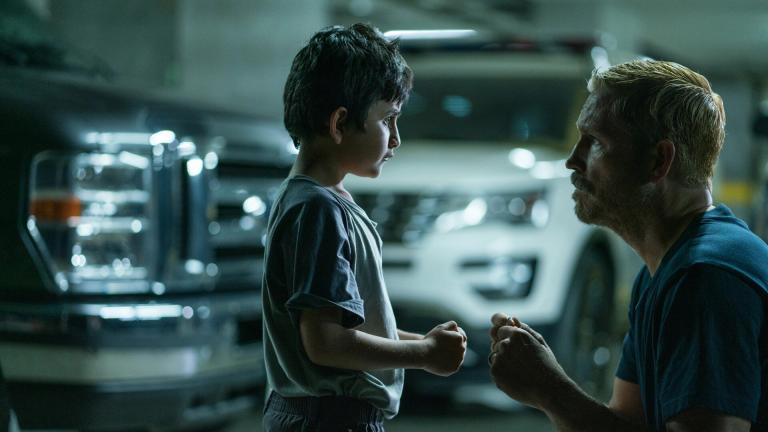“Never Trust a Pedophile” – Tim Ballard
Like most Americans, if you spend little time following the mainstream media’s drift into obscurantism and paranoia, motivated by increasing irrelevance in the social media age, you’d write something like Krista Bontrager, a Conservative Christian writer, saying, “the film has now become entangled in another weird controversy.” And, like many evangelicals who have begun retreating from the political unraveling of our times and, faced with an increasingly immoral and “weird” hostility towards Christianity, you would make what appears to be a neutral and nuanced conclusion, but, nonetheless, one still supportive of that immoral and “weird” hostility. In short, you would not promote the film until further notice.
While there have been several good reviews of the film, such as Owen Gleiberman’s review at Variety or Kirsten Fleming’s piece at the New York Post, or an in-depth discussion of the film which mentions every controversy the film has ever been engaged in since before Angel Studios was in existence, I will discuss the parts everyone seems to mention but no one seems interested in confronting head-on. These are the weird, the strange and the immoral parts the that have taken hold of the political left (progressive Christians included) and are expressed in “news” outlets like RollingStone, The Guardian, The Atlantic, and Jezebel. My hope is that by providing a glimpse into the “new normal” of our age, one will realize that Christians are no longer free to have the appearances of nuance and neutrality. We are in an age where such “indefinite pauses” for reflection are popularly acceptable means to pressure otherwise well-intentioned people into political paralysis.
The Political Contours of the Film (Warning: Potential Spoilers)
If it were still possible for someone to enter the theater and watch a film without political eisegesis, and if one could imagine enjoying the silver screen for its simple miracle of entertainment, then few would detect any thread of controversy in Sound of Freedom—besides, of course, that sex trafficking is a moral evil and we ought to do something about it. But we do not live in those times, and, perhaps, in some backwater town or for some isolated homeschooler who’s only reading the Bible and Shakespeare, those people have long since perished from western civilization. Today, most viewers are living in a quasi-schizophrenic state—both aware of the political drama and actively attempting to prevent it leaking into every aspect of their lives. As such, they are left confused and conflicted when they see the media machine clamp down, yet again.
The mainstream media only sees in political contours. So, to provide clarity, here are the political contours from “Sound of Freedom” in their incendiary contexts.
In an opening “sequence that’s suck-in-your-breath devastating”, we witness how Roberto (José Zúñiga), the father of 11-year old daughter Rocio (Cristal Aparicio) and 7-year-old Miguel (Lucás Ávila), is convinced to allow his children to audition for a music competition, overseen by Katy-Gisselle (Yessica Borroto Perryman). The sequence begins with a beautiful Yessica Perryman pitching a promising future to Roberto, his daughter begging him to take the opportunity, their traveling to a distant city for the audition, dropping his two children off in a room with a dozen or so other children, and, when he returns to retrieve his children, faced with an empty building without a trace of a child.
And here, already, begins the political eisegeses of the Left.
Political Eisegesis #1: “White Savior Complex”
In real estate, they say three important principles are “Location”, “Location”, and “Location”—thus so with the left in their political critique. The location of this initial sequence is Honduras, which, for anyone with a map (hopefully, even for those without a map), know it’s not only located outside the United States, it’s also located south of the border—far enough south not to be Mexico, but not south enough to be outside North America.
Juxtapose this sequence with the following sequence introducing Tim Ballard (Jim Caviezel), and you have the “white savior” critique already flowing out of every liberal parrot’s mouth. And why not? You have an actor who, having already played Jesus Christ in Mel Gibson’s The Passion, starring as a blond-haired, blue-eyed, straight, family man who is about to giga chad his way over the Southern Border to save children living in, what liberals refer to as, “a minority community,” because they have been deceived into sex slavery by a black woman.
This theme is only later confirmed when the savior himself descended from his suburbia home to save Miguel at the US-Mexico border. One must wonder if Paul Schrader even saw the scene, or if his eye’s glazed over and transported himself back to 2015 when Trump, announcing his presidential bid, said, “When Mexico sends its people, they’re not sending their best.”
Political Eisegesis #2: Drag Queens, Grooming and The Erasing of Identity
But there is something more profound, and I believe more central to the message of “Sound of Freedom” and, therefore, closer to heart of leftist resentment of the film. It takes place between the initial sequence of Rocio and Miguel being taken into sex slavery and Miguel’s later conversation with Ballard at the border. It is a continued theme with the saving Rocio, at the end. It has to do with the children’s real names.
Once Roberto drops-off his two children at the location he believes is the audition, Katy-Gisselle begins a sexualizing process of the children. The children are required to stand before a camera and strike different poses. Some of them have their postures adjusted; some have their clothing altered by unbuttoning their shirts. Rocio stands before the camera like any 11-year-old girl would—her hair pulled back, hands on her hips, smiling as if for a yearbook photo. The camera takes a few photos. Katy-Gisselle then steps in, causing Rocio to be a little confused. Katy-Gisselle takes Rocio’s head band and fixes her hair and posture, making her more sexualized. Rocio smiles for the camera, but it’s not the same genuine smile. A few more photos. Then Katy-Gisselle steps-in, again, adds lipstick. More photos, more sexualized poses, but no genuine smiles are left.
A glimpse at the finality between freedom and slavery is juxtaposed between Miguel’s conversation in the van with Ballard at the border crossing and Katy-Gisselle’s conversation in the van with the children on their way to the port. Katy-Gisselle begins assigning the children new names. Their old names, their old lives, are no more. But when Miguel is found at the US-Mexico border, Ballard asks Miguel for his name. Miguel says, “Teddy Bear,” and Ballard responds, “No, your real name.” The moment Miguel knows he’s free is when Ballard, after asking for his name, asks Miguel for his real name. That’s when Miguel knows he’s saved. It’s also the moment, in the jungles of Cambodia, that Rocio knows freedom has arrived—Ballard calls her by her real name.
What’s controversial? The entire sequence plays upon our intuitions that what they’re doing to these children is wrong. It is terribly wrong, it is evil. They’re sexualizing ignorant children and then sealing their fates with a new name. But how can those intuitions exist, let alone be promoted in a film, when the sexualization of girls and the bravery of drag kids is defended?
The sequence between the descent into child sex slavery and the descent into child drag is the same. First, the removal of their traditional roots. Second, exposing them and normalizing them to sexualized poses and sexualized fashion. And third, in an act of rebirth and confirmation, their names are changed. The only difference one could argue between grooming children for sex slavery and grooming them for entertainment is that there exists some level of mere consent. But the “veil of consent” is much too thin for society at large, let alone the movie critic, to keep the camps separated. Either the veil will be shredded by those who believe sexualizing children is evil or by those who believe it is empowering—both cannot co-exist for long.
Political Eisegesis #3: Calling Evil, “Evil”
And there is one more contour that should be noted—a clear and present sexual ethic. If there is nothing else, a viewer of this movie will walkway with this: pedophilia is evil. The question of Minor Attracted People and the virtuous pedophiles community have no stage to make their case, and the movie makes this clear. Even Miles Klee, in confronting some of the problems in the procedural logic of the film, can’t help but demean what he believes is gratuitous, where, after Tim Ballard quotes Mark 9:42, “the drooling creep with requisite glasses and pervert mustache gets his head slammed against a table once more” (Which, the table part actually didn’t happen in the film). Then Tim Ballard says, “Never trust a pedophile.”
The point is made much clearer later in the film in a conversation between Ballard and Vampiro (Bill Camp). Vampiro is relating his experience about how, one night after being hopped-up on on cocaine, he realizes he’s slept with a 14 year old girl. He says,
All of a sudden, I’m hit by this tidal wave. This tsunami of darkness. And I know I’m the sadness in her eyes. Me. I’m the darkness. And I know the darkness has to die. So, I get my .45, put it to my head, put my finger on the trigger. Now, if there is a time to ask if God exists, that would be it.
To put it simply, the film sends a clear message that pedophiles should not be trusted, and that pedophilia is dark, evil, and that death is not an over-the-top sentence for the crime. In fact, the act of pedophilia should inspire such an intuitive response even in high-level cartel members—death to such darkness. And with such a strong line in the sand—perhaps, better stated, carved into stone—one gets the overwhelming impression that “consent” wouldn’t be a legitimate objection to the underlying philosophy of the film. If the children consented, I don’t believe the heinousness of the crimes suddenly evaporate. There is no room for such gymnastics in this film’s domain.
Despite questions regarding the legitimacy of QAnon’s assertion that there exists a global pedophile ring consisting of powerful people (After Epstein, I’m not sure how this position is even tenable), the politicizing of this film is in exact proportion to the film’s unapologetic confrontation to the most powerful social forces in today’s political unraveling.
And this is where I would have to disagree with the real Tim Ballard when he says, “This movie wasn’t designed to be political… Too much has changed [in our society] since then [2018].” In fact, to the contrary, the politicization of the media began well before 2018 (at the completion of this film) and with pizzagate taking place in 2016, I’m almost certain this movie would have received just as much or more blow-back then as now. It was always going to be ridiculed and connected to any conspiracy theory to discredit its message or persuade its viewers to not attend (One wonders if Rollingstone or The Guardian going to mention the extensive work of “Q” in James Bond lore).
All Quiet on the Christian Front?
By talking about, or publishing on, “Sound of Freedom”, you’re entering the flashpoint of our social mores. As Krista Bontrager points out, on the one side you have several media outlets having meltdowns over the film. On the other, you have “[m]any Christians [who] don’t even seem open to having the conversation about whether Ballard’s stories—the ones that he repeats in interview after interview—might not be completely true.” But this should be the meta-red flag flying high, compelling us to dig deeper into the social dynamics of our age. How is possible that there is a total and complete schizophrenic existence in our society—one side condemning it as the swampy scum bubbling up from the bottom of our social pond, the other defending it as the sole light in our dark world?
Instead of addressing the actual problem, many Christian commentators and publications are asking questions on the fray of the social conflict—questions everyone else are either already asking or that the culture has no care for their answers. It’s almost as bad as Liz Wheeler trying to respond to Andrew Tate by quoting Job or Allie Beth Stuckey going with the classic shoulder raise, “I don’t know why anyone would follow a thoroughly evil and unfollowable person.” It’s thoroughly incredible. And we find the same problems espoused by Christian critics regarding “Sound of Freedom.” They broadly fall into two broad camps.
Squaring Off on Sound of Freedom
The first camp are the Christians who, backing away from moral clarity and advocacy in the public square, fall into the socially acceptable position. This first sort is typical of those like Emily’s Belz’ piece at Christianity today, entitled, “What Anti-Trafficking Experts Think of the Hit Movie ‘Sound of Freedom’” . It runs something like this: “The film is great, but it doesn’t really capture what human trafficking looks like. The film is great, but the rescue operations portrayed in the film really isn’t what most anti-human trafficking organizations deal with. The film is great, but if we’re too focused on this sort of film, we’ll miss the broader picture of human trafficking. The film is great, but it portrays things which could make human trafficking worse. This film is great, but American audiences really can’t help with human trafficking in other countries. The film is great, but the film really isn’t accurately portraying what’s happening.” Do we understand the rub?
It’s like an awkward, end of the relationship conversation where you want to say, “Everything if fine, but it’s over. We had such great times, but not great enough.” They do not outright condemn the film, but, as it goes, there’s enough problems to—nudge, nudge—condemn the film nonetheless.
There is another type I would also include in this group, though it tends to be more academic. A prime example is Bontrager’s piece, entitled, “Differentiating Between Fact and Fiction Isn’t Always Easy.” It does much of the same as those typical of the Christianity Today’s piece, however, it runs in reverse with a hypothetical condition. This is fairly typical of the academic world. “The film doesn’t really capture what human trafficking looks like, but the film could be a good. The rescue operations portrayed in the film really isn’t what most anti-human trafficking organizations deal with, but the film could be good. The film portrays things which could make human trafficking worse, but the film could be a good.” Though it’s not like an awkward, end of a relationship conversation, it’s more like an awkward meta conversation about the unknowns of the relationship as it now stands, “It could be over, but we’ll have to see where it goes. We had some potentially decent times, but they could be better.” They do not outright condemn the film, but, as it goes, there’s enough sophisticated worries they ultimately—nudge, nudge— condemn the film nonetheless.
The second camp is held more like those from the piece published by the Gospel Coalition, “Is ‘Sound of freedom’ the Next ‘Uncle Tom’s Cabin’?” It runs almost diametrically opposite of the first group. They argue that the film is great, but it doesn’t achieve it’s overall objectives by appealing to an esoteric criteria and judging the film by an end credit scene to justify their conclusion regarding the film. It’s odd, but it provides a shield against what perhaps is social pressure to not simply enjoy and support the film—“The film is great! But there’s this obscure objection which I totally agree with so that I do not come off as a shill for the film”.
And then there’s this other camp, or at least, a lonely tent which should be turned into a camp, illustrated by Ian Giatti at the Christian Post. His piece is entitled, “Box-Office surprise ‘Sound of Freedom’ brings out ‘QAnon’ catcalls from The Guarding, Rolling Stone.” He spends his article demonstrating the complete and open hypocrisy of The Guardian, Rolling Stone, The Washington Post and their flagrant use of conspiracy theories and anti-Christian slurs in attempts to push-out anything that may stand as a moral critique to their social enterprise. While I do wish he could have blended his article with Madelein Kearns piece from National Review, entitled, “Sound of Freedom’s Moral Clarity”, bringing together both the social critique and the social achievement of the film into what could have been a perfect review, he understands that the media blitz is intentional and has identified enemies.
Leaning Into or Avoiding the Controversy
But this is all to say that, fundamentally, at the heart of social wars and the controversies surrounding this film is a division between those who are willing to lean into the moral and social controversies, and those who will provide a degree of separation from themselves and that controversy. On the Christian front it is troubling because many appear to accidentally shill for the Left and contributes to those, who as Chesterton observed, are willing to use any argument as long as they can hurl it at the church, or, in this case, a clearly Christian morality.
We know that “based on a true story” in Hollywood-ese means, “something happened at one point or another and it’ll be mentioned at some point in the film.” We could provide almost an endless list of stories, from horror to children’s fairytales, that have been taken into Hollywood and morphed into their own image. And yet, as long as the movie is morphed into the image of Hollywood, it passes the inaccuracy test by an appeal to “artistic license” and “a fresh new look” or even “a push against it’s patriarchic roots”. However, if you morph a movie into a compelling message that indicts their moral mores, then what? That there is a clear act of sexual immorality, that there is evil in this world, and that it can be punished by death? Then every argument is a legitimate argument as long as it can be thrown against it.
And therein lies the sadness of those well-intentions Christians who, seeing a complex and tumultuous social wave against “Sound of Freedom,” in appealing to otherwise neutral and nuanced reasons, ultimately agree with, or effectively endorse, both those who want “Freedom’s” message hidden from sight and those who wish to turn the film’s supporters into social pariahs.
This must stop.
The Call to Action
As “Sound of Freedom” ends with a call to action by Jim Caviezel, I think it is perhaps fitting to end this politically incorrect review in similar fashion. From this speech by Caviezel, which is a rendition of Reagan’s speech and is drawing much criticism from the Left, he says:
“They have told us a solution of peace without victory. They call their policy accommodation and they say if we only avoid any direct confrontation with this enemy, he’ll forget his evil ways and learn to love us. All those who oppose them are indicted as warmongers. They say we offer simple answers to complex problems and yet they have the nerve to call it a choice.
Ladies and gentleman, we cannot buy our security of one nation under God—our freedoms in Christ our savior—from the threat of the devil any longer. By committing an act of immorality so great as saying to millions and millions of little children, who are caught behind the Iron Curtain of sex trafficking and abortion, give-up your dreams of freedom, now, because in order to save our own skins we’re just too willing to make a deal with your slave masters. And Alexander Hamilton said that any nation which can prefer disgrace to danger is prepared for a master and deserves one.
…
And this is the specter our well-meaning Christian liberal friends refuse to face. Our priests, our pastors, and now, sadly, even our Pope. That his policy of accommodation is appeasement and it gives us no choice between peace and war—only between fight or surrender. If we continue to accommodate, continue to back [sic] and retreat, eventually, we will have to face the final demand, the final ultimatum.
[Satan] has heard voices, pleading for peace at any price … and therein lies the road to war.
Where then lies the road to peace, you say? Well, it’s a simple answer after all: that you and I have the courage to tell our enemies there is a price we will not pay, there is a point beyond which evil must not advance.”



















